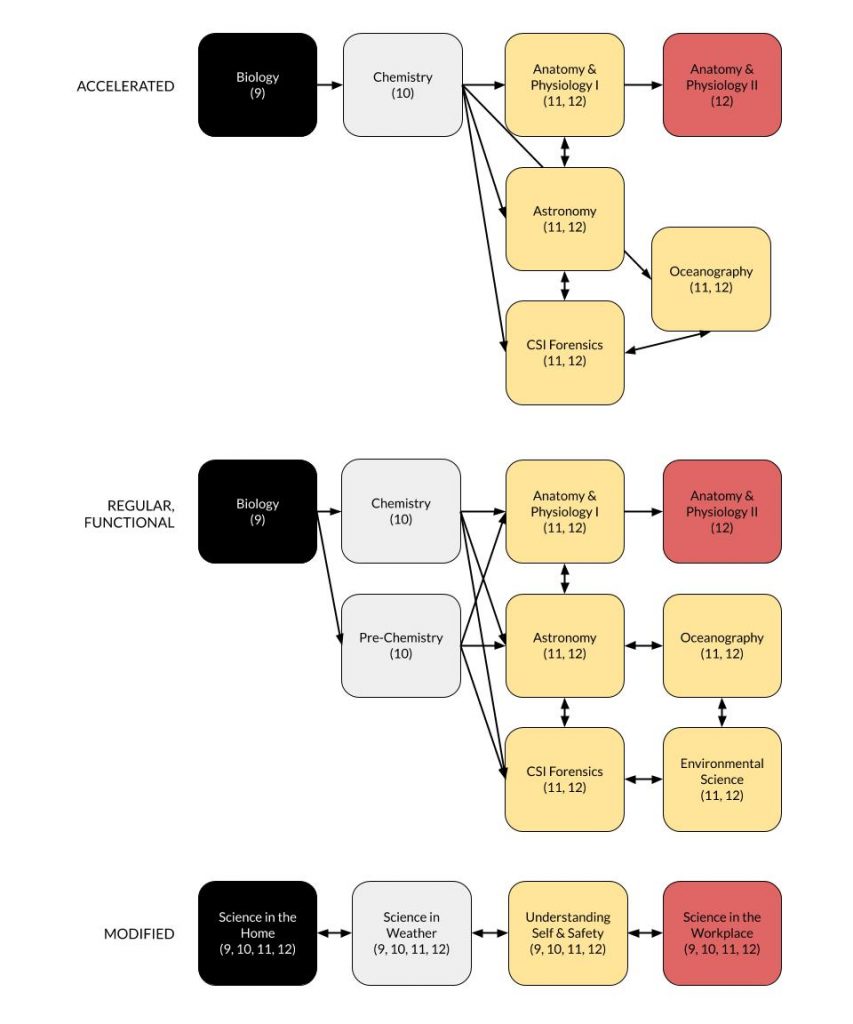
Accelerated, Regular & Functional
Biology Grade: 9/10 Credit: 1.0 Length: Year
Content: Nature and scope of science/biology; chemical makeup of living things; cells as units of structure and function; the process of inheritance; structure and function of viruses, micro-organisms, plants and animal, and ecology.
Pre-Chemistry (Functional or Regular) Grade: 10/11 Credit: 1.0 Length: Year
Content: Who invented Chemistry? Who invented soda water? Who discovered that water is made of two gases? Who invented the battery? Who created the Periodic Table? Why? What are all those elements on the Periodic Table, where did they come from and what are they used for? What is the future of Chemistry? These are questions that will be answered. There are some fascinating labs that go along with each of the topics studied. Lots of hands on activities.
Chemistry (Accelerated or Regular) Grade: 10/11 Credit: 1.0 Length: Year
Prerequisite: Algebra I
Content: Chemistry is for students who are interested in the studies of chemicals and their reactions. Chemistry is required to prepare the students for the careers in anatomy, physiology, courses offered at the college level. With the basic interest and understanding of chemistry and chemicals, the students’ worlds of careers are open even wider than before. The advisory boards of the various allied health and science fields recommend the topics that will be presented.
Environmental Science (Regular or Functional) Grade: 11/12 Credit: 1.0 Length: Year
Content: Environmental Science is a study of the Earth’s ecosystems & biomes, major global pollution problems, Wisconsin native prairies, and “hands on” projects on site to facilitate comprehension of material.
Astronomy Grade: 11/12 Credit: .5 Length: Semester
Content: Students will learn about the earth, the solar system, stars, the galaxy and the universe. Students will have hands-on experience in planetary science and will study the latest astronomical research and discoveries.
Crime Scene Investigation (CSI)/Forensics Grade: 11/12 Credit: .5 Length: Semester
Content: Crime scene investigation is hotter than ever! Students will love learning about how detectives use science to figure out crimes. Students will learn about great Detectives, forensic careers, do different kinds of tests at crime scenes, and even solve a crime! Topics of Study: Forensic careers, Definitions of various crimes, Evidence collection, Physical and Chemical Evidence, Blood-stain identification, Ballistics, Dental impressions, Footprinting, Hair/fiber testing, Entomology, Crime scene Photography and DNA.
Oceanography Grade: 11/12 Credit: .5 Length: Semester
Content: Welcome to the wonderful world of underwater creatures! During this one semester course, we will take a journey through the oceans and streams of the world to discover many of the charming, exotic, fascinating and fanciful creatures in the world. You will keep a notebook to journal information and keep track of our explorations and experiments. Topics of Study: The Ocean Floor, Parts of the Ocean, Aquatic Animals, Whales, Seals and Sea Cows, Aquatic Herps, Sharks and Rays, Crustaceans, Mollusks, Cephalopods, Cindarians
Anatomy & Physiology I Grade: 11/12 Credit: .5 Length: Semester
Content: Take this one semester in-depth journey of Anatomy & Physiology of the human body. From the brain in your head to the nails on your toes, you will encounter fascinating facts, engaging activities, intriguing experiments, and learn about the human body and how to keep it working well. Topics of Study: Beginning with a brief introduction to the overall body, the basics of life, cell and how they function, you will then voyage through lessons covering many subjects, such as the body systems: Integumentary (skin), skeletal, muscular, nervous and the endocrine system.
Anatomy & Physiology II Grade: 11/12 Credit: .5 Length: Semester
Content: This is a one semester in-depth continuation of Anatomy & Physiology I. You will investigate the body systems not yet discussed including blood, cardiovascular, lymphatic, digestive, respiratory, urinary, and the reproductive systems. There are lab activities for each of the systems studied.
Modified
Science in the Home Grade: 9/10/11/12 Credit: 1.0 Length: Year
Content: Students will gain an awareness of the variety of dangers that can be found in a home. Students will identify a variety of tools that is used in a home such as kitchen tools, yard tools, cleaning supplies, etc. Students will learn how to properly and safely use the tools. In addition, students will also learn some basic maintenance such safely changing a lightbulb or cleaning a clogged drain. Students also will learn who they can contact in the community for assistance in the home (ex: plumber, electrician, lawn care, etc.).
Science: Weather Grade: 9/10/11/12 Credit: 1.0 Length: Year
Content: This full year course will focus on the various aspects of weather. Emphasis will be on determining temperature, appropriate clothing for each season, being able to predict the weather based on cloud formations, understanding the cause of natural disasters and how to respond appropriately, as well as identifying weather symbols and being able to understand a meteorologist’s report(s).
Science: Understanding Self and Safety Grade: 9/10/11/12 Credit: 1.0 Length: Year
Content: This full year course provides the student with the opportunity to understand more about themselves. Hands on activities will be used to measure their height, weight, shoe size to aid in understanding about clothing size. Units related to healthy food choices, healthy lifestyle choices, personal cleanliness, and proper exercise will be provided. Safety in the home will also be emphasized related to fire, electrical, and prescription and over the counter drug safety.
Science in the Workplace Grade: 9/10/11/12 Credit: 1.0 Length: Year
Content: This full year course provides the student with knowledge of simple machines that may aid in successful work placements. Units about planes, pulleys, screws, and levers will be explored. Along with these units there will be a strong emphasis on work safety such as proper safety equipment, attending to the work environment, reporting unsafe conditions, and personal safety.
